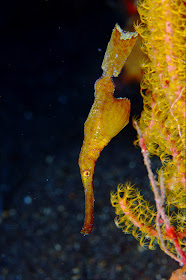 |
| Image: Nick Hobgood |
Ghost Pipefish aren't really Pipefish at all! That's why they're also known as False Pipefish. They belong to an entire family of their own called Solenostomidae, and in that family is just one genus, and in that genus is only about 5 or so species.
 |
| Image: Randall, J.E. Long-tailed Ghost Pipefish (Solenostomus armatus) |
 |
| Image: Nick Hobgood Delicate Ghost Pipefish (Solenostomus leptosomus) |
If you look closely, you can see that behind the big dorsal fin is a small transparent one with a corresponding anal fin underneath. That's one way we know this isn't a true Pipefish, since they have just one dorsal fin and none of the others we just looked at. Who thought a ghost would hog all the body parts?
 |
| Image: Klaus Stiefel Robust Ghost Pipefish (Solenostomus cyanopterus) |
 |
| Image: Smithsonian National Museum of Natural History |
Here we can see how the female (top) is somewhat larger than the male (bottom). We can also see two features which mark the Ghost Pipefish as a member of the order Syngnathiformes. Like Pipefish and Seahorses, they have fused jaws with a small mouth at the end so that they have to suck up tiny crustaceans when they eat.
 |
| Image: Nemo's Great Uncle |
 |
| Image: prilfish |
 |
| Image: Steve Childs |
Video: Robert Suntay
 |
| Image: prilfish Velvet Ghost Pipefish |
Video: Shane Siers
Halimeda Ghost Pipefish (Solenostomus halimeda).
Looks like he's holding on with a bit of thread!
Green. Be green and look like a plant. That works for me. It's good, old fashioned, meat-and-potatoes camouflage, just like grandma use to make...
 |
| Image: Steve Childs Ornate Ghost Pipefish (Solenostomus paradoxus) |
It's also known as the Harlequin Ghost Pipefish because that's what it looks like. Those darn theatricals! That's what grandma used to say.
 |
| Image: sturmjah |
Perhaps predators see it and simply can't work out what it is at all? Maybe they're like "does not compute" and move on?
But then you see them lounging around coral or feather stars! If you see them...
Ornate Ghost Pipefish tend not to hang out on the sea floor, they prefer slightly higher spaces. With a suitable backdrop behind them those complicated patterns and ludicrous over-abundance of sticky-out bits merge really well with the stems and tentacles.
It's a bit like how tiger camouflage works. Put them in a photography studio and it doesn't work too well. Put them in the place where they actually live and it's pretty great.
 |
| Image: Bernard DUPONT |
The Ornate Ghost Pipefish is another one who starts off tiny, transparent and floating around in the sea. They later settle down to mature and mate. Ghost Pipefish are often seen in pairs and they may well be monogamous.
Video: liquidguru
However, unlike Pipefish and Seahorses, it's not the male who gets pregnant, Those great, big ventral fins on the underside are modified into a kind of brood pouch which the female uses to hold her eggs.
They hatch, and production soon begins on the next season of the Adventures of BatAardvark. They just have to grow up first. I can't wait to see how the showdown with Harley Quinn turns out!

now THESE critters are cute. :)
ReplyDeleteHahaha! We got there in the end!
ReplyDeleteThose Ornate Ghost Pipefish are beautiful.
ReplyDeleteI know! They're incredible!
ReplyDelete